| Srl | Item |
| 1 |
ID:
161133
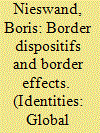

|
|
|
|
|
| Summary/Abstract |
The article argues that transnationalism and border studies offer complementary perspectives where each can inspire the other. Based on two case studies, the notions of border dispositifs and border effects are developed as analytical lenses for researching and conceptualising the nexus between transnational migration and border regimes. While the border dispositifs perspective facilitates a de-reification of borders and shifts the focus on how inequalities are produced by specific border locations and situations, the border effects perspectives reifies the notion of border in order to capture structural effects which border regimes have on transnational migrants’ lives. Finally, the article introduces the notion of border capital to theorise effects that borders have on resources of persons who are mobile across borders. It aims at capturing the impact of borders on inequalities between mobile and sedentary persons.
|
|
|
|
|
|
|
|
|
|
|
|
|
|
|
|
| 2 |
ID:
067314
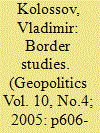

|
|
|
| 3 |
ID:
189865
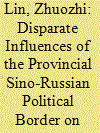

|
|
|
|
|
| Summary/Abstract |
The resurgence of sovereign states in a highly globalized modern world calls
for new approaches to border studies. The present paper suggests looking
at political, sociocultural and economic borders as constructs of dynamic
boundaries influencing people’s interactions. Through an oral history of a
mixed Sino-Russian ethnic community, and a narrative review of smugglers
and shuttle traders, this study examines how the flux of the political border
between the Heilongjiang1 province and the Russian Far East (HLJ-RFE political border) changed the sociocultural and economic borders during
three periods: the 1910s-1920s, the 1960s-1970s, and the 2000s-2010s, when
the political border was characterized as being porous, hostile, and friendly,
respectively. The study shows that the HLJ-RFE political border had a strong
impact on limiting the sociocultural demarcation, but a much weaker effect on
facilitating sociocultural interactions and economic regulations. The results
of the study demonstrate how a strong and friendly political border may lose
its potency when utilized by the local government to facilitate interethnic
integration. Furthermore, the study warrants an interdisciplinary approach to
border studies and a region-oriented methodology.
|
|
|
|
|
|
|
|
|
|
|
|
|
|
|
|
| 4 |
ID:
126994


|
|
|
|
|
| Publication |
2013.
|
| Summary/Abstract |
Mainstream post-positivist approaches to Border Studies typically represent national borders as losing their importance or blurring. This insight usually fails to grasp the perspective of those who have to cross 'hard' borders, for whom these borders are primarily 'hard facts' quite precisely restricting territorial limits of their movement. Aiming to take this perspective and practical problems experienced by such border crossers into account, the author proposes an approach focusing on communication between those who cross 'hard' borders and those who protect these borders. The case of the EU-Russian border shows that border crossers have an increasing range of options to make themselves heard by their own country's officials, though it is much more difficult for them to reach gatekeepers and public on the other side of the border without resorting to intermediaries (such as their states or business actors). The author suggests that border crossers could be heard better if cross-border cooperation initiatives would prioritise this purpose thus making the EU's external borders not only 'friendly' or 'blurred' but also 'dialogic'.
|
|
|
|
|
|
|
|
|
|
|
|
|
|
|
|
| 5 |
ID:
138967
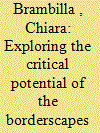

|
|
|
|
|
| Summary/Abstract |
The conceptual evolution of borders has been characterised by important changes in the last twenty years. After the processual shift of the 1990s (from border to bordering), in recent years there has been increasing concern about the need to critically question the current state of the debate on the concept of borders. Within this framework, this article explores the critical potential of the borderscapes concept for the development of alternative approaches to borders along three main axes of reflection that, though interrelated, can be analytically distinguished as: epistemological, ontological and methodological. Such approaches show the significant potential of borderscapes for future advances of critical border studies in the era of globalisation and transnational flows, thereby contributing to the liberation of (geo)political imagination from the burden of the ‘territorialist imperative’ and to the understanding of new forms of belonging and becoming that are worth being investigated.
|
|
|
|
|
|
|
|
|
|
|
|
|
|
|
|
| 6 |
ID:
067317
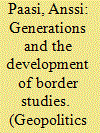

|
|
|
| 7 |
ID:
067318


|
|
|
| 8 |
ID:
167053


|
|
|
|
|
| Summary/Abstract |
In South Asia, the movement of people and goods across borders is strictly controlled by states. However, there are some exceptions to these factors. India–Nepal border, for instance, is peaceful and porous with minimal restrictions on the movement of goods and people. Albeit there are times when border issues between these two friendly neighbours have taken a critical turn. One such recent border-related problem between India and Nepal was witnessed during the Madheshi movement. In 2015, an agitating section of the Madheshi community blocked the India–Nepal border. Due to the sociocultural proximity of Madheshi community with India, the blockade of the Indo-Nepal border has had repercussions on the bilateral ties. Conceptually, this article argues how border shapes relations between neighbours in South Asia. Empirically the recent blockade of the India–Nepal border is presented as an example to substantiate the primary argument of this article. There is also an attempt in this article to study the recent changes in the India–Nepal relations from the perspective of border studies.
|
|
|
|
|
|
|
|
|
|
|
|
|
|
|
|
| 9 |
ID:
067316


|
|
|
| 10 |
ID:
129618


|
|
|
|
|
| Publication |
2014.
|
| Summary/Abstract |
The aim of this contribution is to present a conceptual framework with potential application across the interdisciplinary field of border studies. This framework should embrace interdisciplinarity and the contextual nature of borders. Based on the systems theory of Niklas Luhmann, it elaborates an understanding of borders as being related to a dynamic process of social bordering/bounding processes that involves spatial, social, and conceptual boundaries. By introducing the notion of 'empirical boundary', our framework aspires to bridge the gap between (radical) constructivist theorising and the analysis of physical realities involved in the (re) production of boundaries.
|
|
|
|
|
|
|
|
|
|
|
|
|
|
|
|